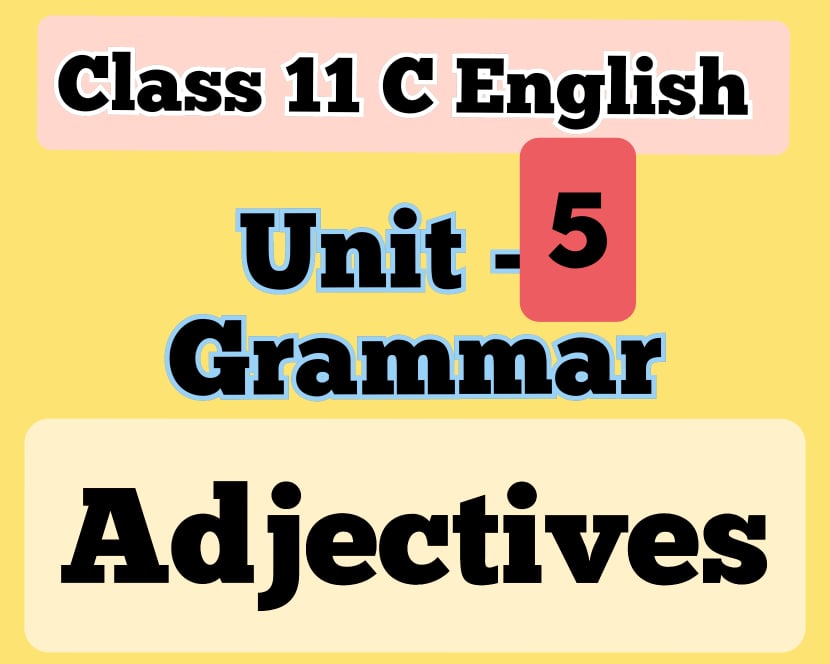Unit-5
Life and Love: The Looking Glass by Anton Chekhov
Grammar Exercise from the Book: ( Page 46/47)
Adjectives:
If the person is feeling what the adj means, then use ed form
If sth else causes the feeling, then use ing.
If a person is cause behind the feeling, then use ing.
Other feeling – ing
Adjectives ending in –ing describe what someone or something is like, whereas adjectives ending in –ed describe how someone feels.
Examples: My friend is boring.
My friend is interesting.
He’s bored with his friend.
They are tired of doing daily homeworks.
Choose the correct word.
a) Sarita was shocking/shocked to hear about earthquake.
Ans: Sarita was shocked to hear about earthquake.
b) I think that rainy days in winter are depressing/depressed.
Ans: I think that rainy days in winter are depressing.
c) The football match was very exciting/excited. I enjoyed it.
Ans: The football match was very exciting. I enjoyed it.
d) The meals at Delight Café are satisfying/satisfied.
Ans: The meals at Delight Café are satisfying.
e) I’ve got nothing to do. I’m boring/bored.
Ans: I’ve got nothing to do. I’m bored.
f) Tanka is very good at telling funny stories. He can be very amusing/ amused.
Ans: Tanka is very good at telling funny stories. He can be very amusing.
g) The teacher’s explanation was confusing/confused. Most of the students didn’t understand it.
Ans: The teacher’s explanation was confusing. Most of the students didn’t understand it.
h) He is such a boring/bored person. He never wants to go out.
Ans: He is such a boring person. He never wants to go out.
i) I will be surprising/surprised if she does well in her test.
Ans:I will be surprised if she does well in her test.
j) Are you interesting/interested in politics?
Ans:Are you interested in politics?
Write the correct form of the adjective in the blanks as in the example.
Example – Grammar rules frustrate me. They’re not logical. They are so frustrating.
- They frustrate me but they don’t bore me. I never get …frustrated… when I study grammar.
- If teachers want to interest the students, they must use …interesting…… materials.
- Certain stories interest almost everybody. For example, most students are …interested… in fairy tales.
- Certain things frighten me, but I never get …frightened… when I speak English.
- If I get a good grade, that excites me. And if I get more than ninety percent, I am really …excited.
Grammar: Will and be going to (Page:48/49)
- Match the expressions in column A with their functions in column B.
| A | B | ||
| a | A: What do you want to take?
B: I’ll have tea, please. |
i | i. Promising |
| b | A: Are you free this evening?
B: No, I’m going to meet my uncle. |
ii | ii. Threatening |
| c | c. The day will be lovely tomorrow. | iii | iii Deciding |
| d | d. There is no cloud in the sky. It’s going to be a lovely day. | iv | iv. Expressing a prior plan |
| e | e. Don’t worry. I won’t tell anyone. | v | v. Predicting a future action |
| f | f. I’ll take you to the movies if you like. | vi | vi. Offering |
| g | g. I’ll tell your parents what you did. | vii | vii. Predicting with evidence |
Ans:
| A | B | ||
| a | A: What do you want to take?
B: I’ll have tea, please. |
i | i. Deciding |
| b | A: Are you free this evening?
B: No, I’m going to meet my uncle. |
ii | ii. Expressing a prior plan |
| c | c. The day will be lovely tomorrow. | iii | iii Predicting a future action |
| d | d. There is no cloud in the sky. It’s going to be a lovely day. | iv | iv. Predicting with evidence |
| e | e. Don’t worry. I won’t tell anyone. | v | v. Promising |
| f | f. I’ll take you to the movies if you like. | vi | vi. Offering |
| g | g. I’ll tell your parents what you did. | vii | vii. Threatening |
Grammar: Will and be going to (Page 49)
- Preplanned actions/decisions- be going to
- Instant decision-will
- Structures : Use will to talk facts or things that we believe are true.
When we are making a decision use will.
- When we want to talk about future facts or things we believe to be true about the future, we use will.
- When you’re talking about actions that are far into the future (months or maybe years from now), use WILL. When you’re talking about actions that you will do soon (tomorrow or next week), use GOING
- Exercise Page:49
Choose the correct answer.
- A: Are you busy this evening? B: Yes, I……am going to watch………….the movies. (will go/am going to)
- A: Where are you going for holiday this summer? B: Not sure yet. Maybe I…… will go …..to Ilam. (will go/am going to)
- I think you…will…..like this movie. (will /are going to )
- I can’t join you at the party, I…am going to……..be away for two weeks. (will /am going to)
- This exercise looks really hard. I…will ………….help you. (will/am going to)
- A: Hello. Can I speak to Sima, please? B: Just a minute. I…will……get her. (will/am going to)
- Perhaps she…will……pass the exam. (will/is going to)
- ‘I haven’t got my phone.’ ‘That’s OK. I…will……..lend you mine.’ (will/am going to)
Complete the sentences using will or be going to with the verbs.
Structure:Will+v1
Is/am/are+going to
- Hari: Did you call Bina? Prem: Oh, I forgot. I……will call…….her now. (call)
- Sunita: Have you got a ticket for the play? Hema: Yes, I…am going to watch……….it on Saturday. (watch)
- ‘The alarm is ringing. It’s making an awful noise.’ ‘OK, I…will switch…..it off.’ (switch)
- Do you think they…will like……the presents we got for them? (like)
- ‘Lok is starting university tomorrow.’ ‘What…is he going to……study?’ (he/study)
- If I meet him, I…will tell……..him the news. (tell)
- The phone is ringing. I…will answer……it. (answer)
- If you don’t stop bullying her, I…will tell…….the teacher. (tell)
Concord/Subject-verb agreement

